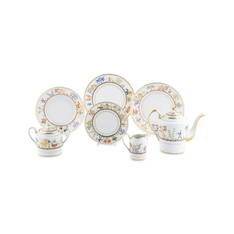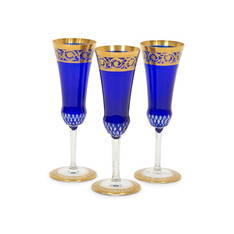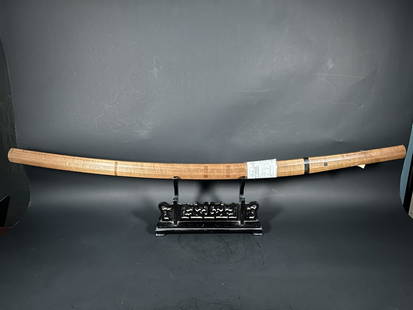
19th C. Nepalese Wood Ceremonial Phurba / Magic Dagger
Similar Sale History
View More Items in Daggers
Related Daggers
More Items in Daggers
View MoreRecommended Weapons & Armor
View More




Item Details
Description
Central Asia, Tibet, ca. 19th century CE. A striking wooden phurba dagger - also known as a magic dagger - in the traditional form of a 3-sided stake. Enveloped in a hue of espresso, the ceremonial weapon features a ridged handle that is corseted at its mid-section and a pointed pommel displaying 3 anthropomorphic faces of the guardian deity Mahakala. Mahakala means the "Great Black One" or "Great Time" in Tibetan, as Kala translates to time. A beautiful, incised motif of an abstract design decorates the entirety of the piece's exterior Size: 8" L x 1.2" W (20.3 cm x 3 cm)
Ben Meulenbeld explains the importance of time in Tibetan Buddhism in "Buddhist Symbolism in Tibetan Thangkas" (Holland: Binkey Kok Publications, 2004): "Time is seen as the destroyer of everything and everyone, and therefore equated with death. On the one hand time is eternal, without beginning or end, always continuing. On the other, this eternity consists of little portions of time that are finite, like human life."
Phurbas are known to symbolize peace and stability, and are thought to keep demons in their place. Only shamans or special individuals empowered to use a phurba are permitted to use it in ritualistic ceremonies. The blade on the phurba is never actually sharp, as it is a ritual dagger rather than a weapon intended to bring about destruction. Padmasambhava is widely regarded as the inventor of the phurba. In the 8th century, Padmasambhava used the phurba to consecrate the ground when he established the Samye monastery. Interestingly, tents have always played significant roles in Tibet as Tibet has always been a nomadic culture, and inserting tent pegs has been interpreted as sacrificing the earth. Hence, the shape of the phurba may derive from the stake used to secure tents.
In order to use a phurba, practitioners begin with meditation, then recite the sadhana of the phurba, inviting the deity to enter the phurba. The shaman then stabs the phurba into the ground, or into a bowl of rice/grain, all the while envisioning that the evil spirits or negative energies are beneath the blade. Phurbas are also traditionally used as decorations in homes and temples, and many practitioners include phurbas in their meditation rooms.
Dorje Phurba also known as Vajrakilaya, who is the wrathful form of Vajrapani (one of the wrathful deities known to remove obstacles) used the phurba. One can oftentimes see Vajrakilaya holding the phurba on Buddhist statues and thangkas. Vajrakilaya's consort is Khorlo Gyedunma, a manifestation of the Green Tara. When a vajra is held in the upraised right hand of Vajrapani assuming his wrathful form, it is interpreted as a weapon, akin to Zeus' lightning bold or Hercules' club.
Provenance: private Brevard, North Carolina, USA collection
All items legal to buy/sell under U.S. Statute covering cultural patrimony Code 2600, CHAPTER 14, and are guaranteed to be as described or your money back.
A Certificate of Authenticity will accompany all winning bids.
PLEASE NOTE: Due to recent increases of shipments being seized by Australian & German customs (even for items with pre-UNESCO provenance), we will no longer ship most antiquities and ancient Chinese art to Australia & Germany. For categories of items that are acceptable to ship to Australia or Germany, please contact us directly or work with your local customs brokerage firm.
Display stands not described as included/custom in the item description are for photography purposes only and will not be included with the item upon shipping.
#170990
Ben Meulenbeld explains the importance of time in Tibetan Buddhism in "Buddhist Symbolism in Tibetan Thangkas" (Holland: Binkey Kok Publications, 2004): "Time is seen as the destroyer of everything and everyone, and therefore equated with death. On the one hand time is eternal, without beginning or end, always continuing. On the other, this eternity consists of little portions of time that are finite, like human life."
Phurbas are known to symbolize peace and stability, and are thought to keep demons in their place. Only shamans or special individuals empowered to use a phurba are permitted to use it in ritualistic ceremonies. The blade on the phurba is never actually sharp, as it is a ritual dagger rather than a weapon intended to bring about destruction. Padmasambhava is widely regarded as the inventor of the phurba. In the 8th century, Padmasambhava used the phurba to consecrate the ground when he established the Samye monastery. Interestingly, tents have always played significant roles in Tibet as Tibet has always been a nomadic culture, and inserting tent pegs has been interpreted as sacrificing the earth. Hence, the shape of the phurba may derive from the stake used to secure tents.
In order to use a phurba, practitioners begin with meditation, then recite the sadhana of the phurba, inviting the deity to enter the phurba. The shaman then stabs the phurba into the ground, or into a bowl of rice/grain, all the while envisioning that the evil spirits or negative energies are beneath the blade. Phurbas are also traditionally used as decorations in homes and temples, and many practitioners include phurbas in their meditation rooms.
Dorje Phurba also known as Vajrakilaya, who is the wrathful form of Vajrapani (one of the wrathful deities known to remove obstacles) used the phurba. One can oftentimes see Vajrakilaya holding the phurba on Buddhist statues and thangkas. Vajrakilaya's consort is Khorlo Gyedunma, a manifestation of the Green Tara. When a vajra is held in the upraised right hand of Vajrapani assuming his wrathful form, it is interpreted as a weapon, akin to Zeus' lightning bold or Hercules' club.
Provenance: private Brevard, North Carolina, USA collection
All items legal to buy/sell under U.S. Statute covering cultural patrimony Code 2600, CHAPTER 14, and are guaranteed to be as described or your money back.
A Certificate of Authenticity will accompany all winning bids.
PLEASE NOTE: Due to recent increases of shipments being seized by Australian & German customs (even for items with pre-UNESCO provenance), we will no longer ship most antiquities and ancient Chinese art to Australia & Germany. For categories of items that are acceptable to ship to Australia or Germany, please contact us directly or work with your local customs brokerage firm.
Display stands not described as included/custom in the item description are for photography purposes only and will not be included with the item upon shipping.
#170990
Condition
A few stable hairline fissures to tip of blade, as well as light surface wear as shown. Some softening of finer details in areas. Otherwise, intact and excellent with rich patina throughout.
Buyer's Premium
- 26.5%
19th C. Nepalese Wood Ceremonial Phurba / Magic Dagger
Estimate $550 - $825
3 bidders are watching this item.
Get approved to bid.
Shipping & Pickup Options
Item located in Louisville, CO, usOffers In-House Shipping
Local Pickup Available
Payment

TOP














































































